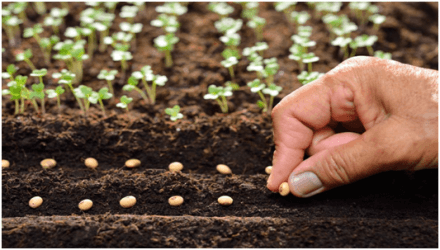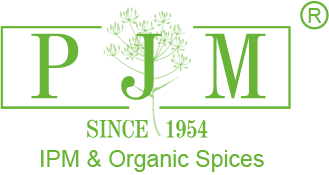Sustainable Farming
Sustainable Journey
This philosophy led to the birth of a Backward Integration Program viz Rainforest Alliance’s Sustainable Agriculture Certification and Organic Certification. With this Backward Integration Program, we have always aimed to bridge the increasing gap between Rural Agricultural Practices and Farming Science and Technology.
We call this initiative “The Green Footprint Program” with the feeling embedded into improving, cleaning and enhancing traceability & transparency through the food chain.

How the journey began!
Our journey for Sustainable Farming began back in the year 2005, in the state of Rajasthan for Cumin Seeds, where we aimed at targeting practicing agricultural techniques without the use of pesticides and re-enrichment of soil in the process of providing an alternative to conventional input-intensive agriculture. Today, more than 15 years later, we’re proud to have been working with more than 8000 farmers across 30 field offices across 20000 acres of pesticide-free land. Sustainable Agriculture and Precision Farming became a consistent practice for us, because not only did it increase importance on pesticide compliance globally but reduced the harvest and storage wastage through our responsible supply chain management.
our responsible supply chain management.
Sustainable Sourcing Activity A-Traceability
- A-Traceability:-
- In the food industry, traceability ensures that food products can be tracked from farm to table. This is important for preventing foodborne illnesses, managing food recalls, and confirming the authenticity of products (e.g., organic certifications).
- In the supply chain, traceability involves tracking the movement of goods and raw materials from the supplier to the end customer. It helps ensure that products are sourced ethically, are free from contamination, or meet required standards.
B-Backward Integration:-
Backward integration is a business strategy in which a company expands its operations by acquiring or merging with businesses that are involved in the earlier stages of its supply chain. Essentially, a company moves “backward” in the production process to gain control over the sources of its raw materials or inputs.
Key Aspects of Backward Integration:
- Control Over Raw Materials or Components: A company moves upstream in its supply chain to directly control the production of raw materials or components it needs. This can reduce dependency on suppliers and provide a competitive advantage in terms of cost and supply chain stability.
- Cost Reduction: By controlling the production of inputs, a company can eliminate or reduce the costs of purchasing these materials from third-party suppliers. This can result in lower overall production costs.
- Improved Supply Chain Efficiency: Backward integration can help streamline the supply chain by reducing reliance on external vendors, leading to greater control over lead times, inventory management, and product quality.
- Control Over Quality and Standards: Companies can ensure that the raw materials or components they use meet their required quality standards. This reduces the risk of defects in the final product and helps improve product consistency.
C.-Contract Farming:-
Contract farming is an agricultural production system where a farmer agrees to grow a particular crop or raise livestock under an agreement with a buyer or company. In this arrangement, the buyer usually provides the farmer with inputs such as seeds, fertilizers, technical guidance, and sometimes even credit. In return, the farmer agrees to sell the produce to the buyer at an agreed price, often before the harvest.
Key Features of Contract Farming:
- Agreement: A formal or informal contract between the farmer and a buyer (which could be a food processing company, exporter, or retailer).
- Supply of Inputs: The buyer may supply essential inputs such as seeds, fertilizer, pesticides, machinery, or technical support.
- Price Agreement: The price of the produce is often set in advance, reducing the farmer’s risk of price fluctuations.
- Quality Standards: The buyer often specifies the quality, quantity, and sometimes the harvest timing.
- CSR Activity :-
Corporate Social Responsibility (CSR) in the Food Industry refers to the actions taken by food companies to operate in ways that benefit society, the environment, and local communities, beyond simply making profits. These activities often focus on sustainability, ethical practices, and community development, all while ensuring the long-term health and success of the business.
Here are some common examples of CSR activities within the food industry:
- Sustainable Sourcing and Ethical Practices
- Sustainable Agriculture: Many food companies focus on sourcing ingredients sustainably, ensuring that crops are grown in ways that preserve the environment. This can include promoting organic farming, using fewer chemicals, and engaging in practices that reduce soil depletion.
- Fair Trade Practices: Companies may participate in fair trade programs that ensure farmers in developing countries receive fair wages and work under decent conditions. Fair trade certification also assures consumers that the company supports equitable trade relationships.
- Responsible Sourcing of Seafood: Many companies in the food industry ensure that their seafood is sustainably sourced, using certifications such as the Marine Stewardship Council (MSC) to guarantee that fish and other seafood are harvested responsibly.
GET IN TOUCH
Latin words, combined with a handful of model sentence structures, to generate Lorem Ipsum which looks reasonable.
